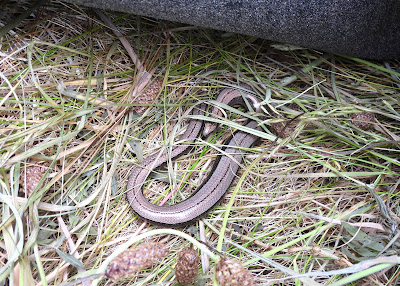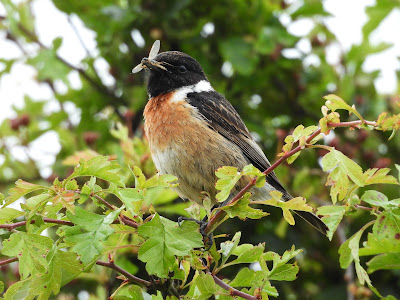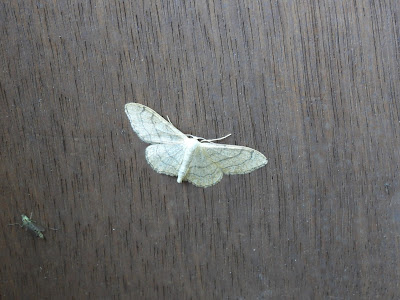I
try and keep my blog posts as positive as possible, celebrating the joy
of nature, but as time goes on, I am struggling. Trying to keep my eco
anxiety in check gets harder all the time. Our beleaguered wildlife is
under constant attack, and I am of certain age where I can remember how
relatively bountiful biodiversity used to be. It shocks me to think
about the sheer number and species that have vanished from the pages of
my notebooks. In comparison to my notebooks from the 1970s and 80s, the
pages of my recent notebooks are empty. It is as if somebody has erased
all the wondrous wildlife from the pages, and they are now blank. And
this just in my lifetime; depressing...
We
have a general election next week in the UK, and the usual political
parties are touting for votes, including a new political party called
Deform, sorry, Reform UK, led by the racist, narcissist, compulsive
liar, and all-round environmental hooligan, Nigel Farage. A quick look
at their manifesto, and it is obvious that a vote for this fascist
party, is a vote against our wildlife. Not a single positive
environmental pledge, but plenty of negative ones!
It reads as though it has been written by a teenage schoolboy, high on a sugar rush, from eating too many Haribo's!
They pledge to:
- scrap net zero targets
- start fast-track licenses of North Sea gas and oil
- grant shale gas licences and enable major production
- explore clean coal mining (an oxymoron, if I ever did hear one!)
- productive land not to be used for rewilding
- replace current farm subsidies with direct payments (oh dear!)
- stop Natural England from taking action that damages farmers
I
don't think the above needs any further explanation, it is quite clear that a
vote for Reform, is a vote to further damage biodiversity in the UK, in a
very measured, and purposeful way. I was particularly alarmed at the
last pledge above, regarding Natural England. It is clear that under
Deform (that is a far better name for them), if a landowner wants to
damage a Site of Special Scientific Interest (SSSI) for example, to
increase production on their land, no action will be taken against
them.
Now, on to the more positive stuff!
I've talked about this before, the fact that there isn't really a summer in the bird world, or perhaps just a couple of weeks at best. Spring starts in early March, and lasts until early June, and then autumn begins in late June, when the first returning waders (failed breeders) appear. So, in the avian world, summer is that small window between early and late June, the exact period that this blog post will cover.
My last post was on 10th June, and to be honest, it has been fairly quiet over the last couple of weeks or so, but there have been a few highlights.
Mid-month we had two back-to-back breeding bird surveys, necessitating two 4:00 a.m. alarm calls! Our first survey site was south of the Ribble near Burscough, and we had virtually full cloud cover with a brisk north-westerly wind.
At this time of year, there are lots of young birds about (nowhere near as many as they used to be), and I love the antics of young Rooks with their parents. We were watching several young Rooks with their parents in an arable field this morning. The adults were busy trying to find food for their now fledged chicks, and I suppose I should technically call them juveniles, and the juvs in their desperation to be fed, were continually badgering Mum and Dad, and being more of a hindrance than a help. Lovely to watch.
Anecdotally, I think Long-tailed Tits have had a good breeding season, as I am seeing flocks of adults and juveniles every time I go out, and this morning was no exception with a flock of at least nine. 'Lotties' are early breeders, and it is likely that they managed to fledge their chicks before the wet weather that has seriously hampered the breeding success of other passerine species.
It was nice to see a pair of Whitethroats carrying food, and I hoped that they would be as successful as the Long-tailed Tits. A singing Yellowhammer was noteworthy, and it is sad to think how much they have declined in my lifetime, somewhere in the region of 62%, and their range has contracted by over 20% as well!
The only other highlights of this particular survey, was the 'sea' of humble, not so humble, Red Dead-nettles that we came across, and a group of six confiding juvenile Swallows.
The following day I was closer to home, on a gloriously sunny morning, although at 5:00 a.m. it was cool in the light north-westerly wind. The number and range of birds singing drops off at this time of the year, as summer is in full swing, but on this morning, I still had two Blackcaps, two Song Thrushes, a Lesser Whitethroat, two Whitethroats, and two Chiffchaffs singing.
A few days before the Solstice, Gail and I had a late morning wander around Marton Mere, and it is at least a couple of decades since I was last here. Singing warblers were the order of the morning, with five Chiffchaffs, five Whitethroats, four Sedge Warblers, two Reed Warblers, three Cetti's Warblers, two Lesser Whitethroats and a Grasshopper Warbler. Very few insects were on the wing, except a few bee and hoverfly species, and a pair of Broad-bodied Chasers. Absolutely no butterflies!
Just after mid-month we had a breeding bird survey to complete on the coast in north-west Cumbria, not far from Whitehaven. It was a cool, overcast morning, but we had good views across the firth to Scotland, and across the Irish Sea to Ireland and the Isle of Man.
The highlights of our survey were the Northern Marsh Orchids, a couple of Slow Worms, and a pair of Stonechats with food, waiting for us to walk past them, before they fed their chicks.
The day after the Solstice, I headed to the Nature Park to clear the net rides, and put the ropes on, in preparation for the forthcoming autumn ringing programme. In one of the net rides was an Early Marsh Orchid, and a Southern Marsh Orchid, and elsewhere I found some Bee Orchids that had gone over.
A moth trapping session over the night of 23rd/24th June with my garden light trap, resulted in the following catch:
Common Emerald - 2
Willow Beauty - 3
Evergestis forficalis - 1
Carcina quercana - 2
Bee Moth - 4
Riband Wave - 1
Dusky brocade - 1
Codling Moth - 2
Light Brwon Apple Moth - 1
Setaceous Hebrew Character - 1
I also trapped a Water Boatman.
I was back at the breeding bird survey site close to home near Poulton-Le-Fylde, just less than a week ago, and I had another encounter with a number of Long-tailed Tits. Again, mainly juveniles with some adults mixed in, and this time I had 20!
Gail and I were carrying out some judicious pruning of the Privet hedge, and some Willows, in our front garden, and we disturbed a Lunar Hornet Moth. I would need to check, but I think this is about the 5th or 6th record for our garden. Willows and Sallows are the food plant for the caterpillars, of which we have both in our front and back garden.
A positive note, to end this not so positive blog post on.













No comments:
Post a Comment